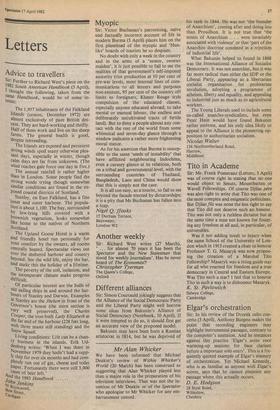erns
Letters
Advice to travellers
Sir: Further to Richard West's piece on the 1982 South American Handbook (3 April), I thought the following, taken from the same Handbook, would be of some in- terest:
The 1,957 inhabitants of the Falkland Islands (census, December 1972) are almost exclusively of pure British des- cent. They are hard-working and thrifty. Half of them work and live on the sheep farms. The general health is good, despite inbreeding.
The Islands are exposed and persistent strong winds spoil many otherwise plea- sant days, especially in winter, though calm days are far from unknown. (The wind reaches gale force one day in five.)
The annual rainfall is rather higher than in London. Some people find the strong winds trying though somewhat similar conditions are found in the ex- posed coastal districts of Scotland.
Stanley, on East Falkland, has a fine inner and outer harbour. The popula- tion is about 1,100. The bay, surrounded by low-lying hills covered with a brownish vegetation, looks somewhat like home to the natives of Northern Scotland.
The Upland Goose Hotel is a warm and friendly hotel run personally for Your comfort by the owners, all rooms centrally heated. Spectacular views out over the sheltered harbour and country beyond. See the wild life, enjoy the bar, and make this the holiday of a lifetime.
The poverty of the soil, isolation, and the intemperate climate make progress difficult.
Of particular interest are the hulls of old sailing ships in and around the har- bours of Stanley and Darwin. Examples at Stanley are the Jhelum in front of the Governor's house (the stern section is very well preserved), the Charles Cooper, the iron-built Lady Elizabeth at the far end of the harbour (228 feet long,
with three masts still standing) and the Snow Squall.
Living conditions: Life can be a chan- cy business in the islands. Erik Ud- denberg writes: 'When I was there in November 1979 they hadn't had a supp- IY ship for over six months and had com- pletely run out of gin, cheese and toilet Paper. Fortunately there were still 3,000
cases of beer left.'
And the 1983 Handbook i.rohn Jenkins liryncasten now Street Cardigan ,


































 Previous page
Previous page